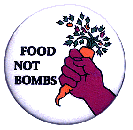 Cook For Peace
Cook For Peace
 Cook For Peace
Cook For Peace
The
Food Not Bombs Story
What We
Are
Tips on Cooking
for a large number of People
Amnesty
Intl. Probes Food Not Bombs Busts
Internet
Links
Food Not Bombs is one of the fastest growing revolutionary
movements active in
North America today and is gaining momentum all
over the world. There are over
175 autonomous chapters sharing vegetarian food
with hungry people and
protesting war and poverty throughout the Americas,
Europe and Australia. The
first group was formed in Cambridge, Massachusetts
in 1980 by anti-nuclear
activists. Food Not Bombs is an all volunteer organization
dedicated to
nonviolence. Food Not Bombs has no formal leaders
and strives to include
everyone in its decision making process. Each group
recovers food that would
otherwise be thrown out and makes fresh hot vegetarian
meals that are served in
city parks to anyone without restriction. The groups
also serve free vegetarian
meals at protests and other events. The San Francisco
Chapter has been arrested
over 1,000 times in an effort to silence its protest
against the Mayor's anti-
homeless policies. The police are currently telling
the Food Not Bombs Chapter in
Seattle, Washington that they are not allowed to
share food with out government
permission. Amnesty International states it may
adopt those Food Not Bombs
volunteers that are imprisoned as "Prisoners of
Conscience" and will work for their
unconditional release.
Food Not Bombs works in coalition with groups like
Earth First!, The Leonard
Peltier Defense Committee, Anarchist Black Cross,
the IWW, Homes Not Jails,
Anti Racist Action, In Defense of Animals, the
Free Radio Movement and other
organizations on the cutting edge of positive social
change and resistance to the
new global austerity program. One collective publishes
a movement wide
newsletter called A Food Not Bombs Menu. There
is also a German language
Menu. Food Not Bombs Publishing in Takoma Park,
Maryland publishes books
like On Conflict and Consensus which has been an
important guide for group
democracy. We hope you will join us in taking direct
action towards creating a
world free from domination, coercion and violence.
What We Are
The first group was formed in Cambridge, Massachusetts
in 1980 by anti-nuclear
activists. Food Not Bombs is an all volunteer organization
dedicated to
nonviolence. Food Not Bombs has no formal leaders
and strives to include
everyone in its decision making process. There
are over 150 groups world wide
each one recovering food that would otherwise be
thrown out and makes fresh hot
vegetarian meals that are served in city parks
to anyone without restriction. The
groups also serve free vegetarian meals at protests
and other events. The San
Francisco Chapter has been arrested over 1,000
times in an effort to silence its
protest against the Mayor's anti homeless policies.
These arrests have been near UN
Plaza where the United Nations was founded in 1945.
The Arcata group has been
facing civil contempt for sharing food and the
Whittier group has been issued
tickets.
Because society and government value material wealth
over human lives, it tolerates the misery and dehumanization of some for
the greater benefit of the few; many of the social problems we currently
face are the results of values that privilege the forces of war and violence
over human needs. In the face of this moral crisis, Food Not Bombs is committed
to building a vital and caring movement for progressive social change and
to challenging the invisible barrier that separates the poor and homeless
from a so-called "normal" society.
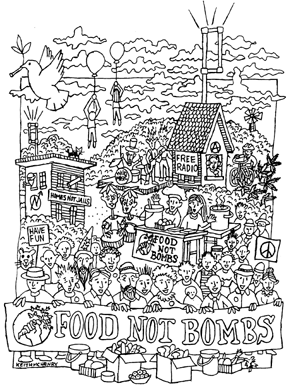
An estimated 26% of edible food is thrown away
every year in this country. Meanwhile, people go hungry, eat inadequate
meals, AND STARVE. Seattle, Inc. largely ignores the growing numbers of
homeless people sleeping in its streets.
Tips On Cooking for Large Numbers of People
Generally speaking, cooking for 100 is not much different from cooking for 10, except the quantities are 10 times greater. However, for a few things this is not true. Spices and salt, in particular, should not just be multiplied when increasing the quantity of a recipe. Much less is needed in most dishes; let your taste buds be your guide. The same is true for the amount of preparation time each dish requires. The larger the volume, the more efficient each task can be done so the overall prep time is reduced. In fact, when a particular ingredient is in several dishes on the menu, it is desirable to prep enough of this ingredient for all the dishes at the same time.
Sometimes, this can be done for events over a couple of days, depending on your available storage space and labor.
Always strive to be on time to every event where you serve food. Sometimes this is difficult or impossible. When time is short, you can do the prep work for easy, quick dishes in advance and do the actual prep and cooking on-site for the longer, more complex dishes.
Soup is one dish which lends itself easily to cooking on site. Upon arrival, set a pot of water to boiling. While it is heating, start chopping and adding vegetables. Once the vegetables start to soften, remove half and serve. With the remaining half, add more water and vegetables and keep cooking. This can go on indefinitely to become a never ending pot of soup.
This same concept can be used in a kitchen setting
when there is a short amount of time to cook a large amount of soup or
when the stove is too small for several large soup pots. Follow the normal
recipe for vegetable soup. When the vegetables have been added and the
broth just begins to boil, drain off most of the broth and save in another
container. Add more vegetables and a small amount of water to the pot and
continue cooking. This pot should now contain enough vegetables and spices
for two (or more) soups and little broth. When the vegetables are cooked,
mix the broth and stock together again in several containers and transport
to the serving site. This should make two (or more) pots of soup using
only one pot and only a little more
time.
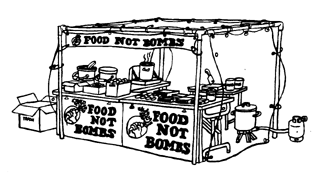 As an
organization, we want to be very inclusive. There is room for all progressive
political perspectives, for everyone to express themselves. For some, the
decision to work for food, not bombs, is a total change in lifestyle. For
others, the decision is expressed through a commitment
As an
organization, we want to be very inclusive. There is room for all progressive
political perspectives, for everyone to express themselves. For some, the
decision to work for food, not bombs, is a total change in lifestyle. For
others, the decision is expressed through a commitment
to life affirming values while continuing to work
at a job for pay in mainstream society. We try to value individuals for
the contribution they have to offer without any expectation that they be
completely divorced from the status quo.
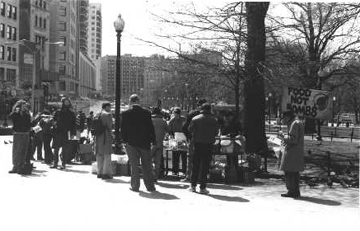 The
world is multi-cultural and social and political structures need to be
sensitive to this reality. Challenging racism, classism, gender-bias, homophobia,
and other oppressive behaviors is essential to creating a life affirming,
self-sustaining world. Everyone needs to be engaged in multi-cultural work.
This includes the members of Food Not Bombs and those with whom we come
in contact, both on the streets and within the other service and political
organizations with which we work.
The
world is multi-cultural and social and political structures need to be
sensitive to this reality. Challenging racism, classism, gender-bias, homophobia,
and other oppressive behaviors is essential to creating a life affirming,
self-sustaining world. Everyone needs to be engaged in multi-cultural work.
This includes the members of Food Not Bombs and those with whom we come
in contact, both on the streets and within the other service and political
organizations with which we work.
One of the unique ways in which Food Not Bombs engages in multi-cultural work is the creation of ways to share access to resources. Food Not Bombs members identify and obtain food resources which the wider community needs. We are an example of how a small group of people with limited economic resources can make a big difference in the quality of life for many people by organizing and recovering a waste product of the existing society. It is our hope that the redistribution of resources other than food becomes an activity that is taken on by an increasingly larger number of people. We are the people we are trying to serve.
Food Not Bombs groups are open and democratic. Decisions
are made using a process called consensus. Consensus creates an environment
in which different opinions can be expressed without fear, and conflicts
can be resolved in a respectful, nonviolent manner. It is not a competition
of ideas to see which one wins the favor of the group. Rather, it is working
cooperatively to synthesize all ideas into the best possible decision for
all involved. Consensus process strives to assure that everyone has an
opportunity to share their point of view and participate in the decision
making. Consensus does not mean that everyone thinks the same
way. People can agree to disagree and still reach
consensus.
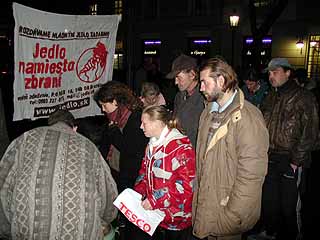
People become empowered when encouraged to participate
and take more responsibility for the decisions and actions of the group.
This teaches people not only how to be powerful nonviolently, but also
how to seek access to power. We will never live in a society in which there
is equal power shared by all people. However, it is possible to imagine
a world in which everyone has equal access to power. Consensus is a process
based upon the opportunity for all participants in decision making. The
particular model your group chooses to use is will be determined by your
size and needs. On Conflict and Consensus (see bibliography) describes
a model of consensus called Formal Consensus. This would be a good place
to start in reating
your own process.
Amnesty Intl. Probes Food Not Bombs Busts
Since 1988, nearly 1,000 arrests of Food Not Bombs (FNB) members in San Francisco have occurred for FNB's distribution of free vegetarian food to the poor and homeless and FNB's protests of the miltarist policies of the U.S. government. Many of those arrested report being subjected to death threats and physical abuse by the police. Both Amnesty International in London and the United Nations Human Rights Commission in Geneva are investigating the FNB case. On October 28th, Amnesty International sent San Francisco city government officials a four-page letter stating that they believed the attacks on FNB are a serious violation of articles 19, 20 and 25 of the Universal Declaration of Human Rights and of other human rights treaties.
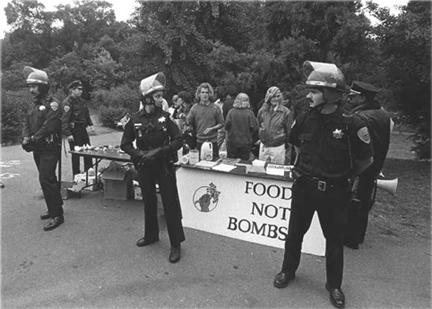 5.
Aug. '88
5.
Aug. '88
It now appears that this pattern of government harassment is expanding to other communities in the U.S. Since May of 1995, members of FNB in Arcata, Calif., have been under continuous police surveillance. On November 7th five members of FNB were schedueld to appear in court to face charges of violating a court order prohibiting the distribution of free food by FNB. The five defendants faced a possible sentence of five days in jail and a $1,000 fine for each violation of the court order. One of the five was charged with serving food on six different occasions and therefore faces a 30-day jail sentence and a $6,000 fine.
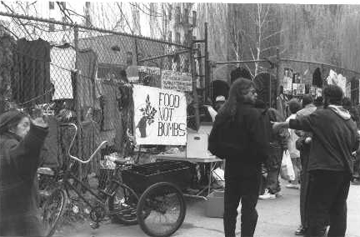
FNB New York
http://www.scn.org/activism/foodnotbombs/
www.foodnotbombs.net
http://www.iww.org/~iw/dec/stories/ai-fnb.html